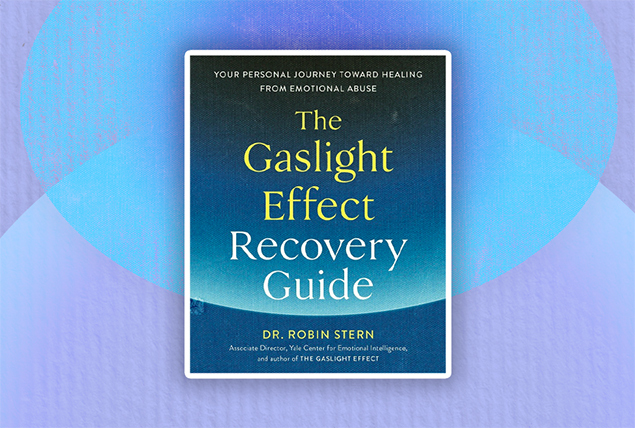How to Deal With Medical Gaslighting

Editor's note: Some of the sources for this article requested their full names and locations not be used.
During appointments with a doctor, do you suspect your symptoms are being dismissed? Do you feel powerless over your own health? Are you told your health concerns are "all in your head?" If so, there is a chance you're being medically gaslit.
What is medical gaslighting?
Many women may be familiar with relational gaslighting, when your partner is gaslighting you. Gaslighting is a manipulative tactic people sometimes use to make their victims doubt themselves. Confusing and harmful, this behavior can make the target question their perception and distrust themselves.
However, medical gaslighting is when a patient feels their doctor has dismissed, downplayed, invalidated or denied their symptoms or illness.
About 72 percent of women report they've been medically gaslit, according to a 2022 survey.
"It can have serious consequences, as it may delay necessary medical treatment and lead to emotional distress for the patient," said Tara Brandner, D.N.P., F.N.P.-C., a fertility specialist and the owner of Simply You Wellness in Bismarck, North Dakota.
The best way to deal with medical gaslighting is to trust your gut, get a second or third opinion, and recognize you aren't alone.
In this phenomenon, a medical professional could ask questions in a patronizing way or make comments insinuating that you're exaggerating. They could flat-out accuse you of making up your symptoms with little clinical data or testing to support their opinions.
This behavior from a medical professional can lead a patient to second-guess themselves or worse—ignore their symptoms or avoid getting help anywhere else for fear people will think they are 'crazy,' according to Michelle Di Paolo, Ph.D., L.P.C., a mental health specialist and the founder of Stress and Relaxation Services of America in Plano, Texas.
Feeling unheard or ignored is too common. One in 5 women experienced mistreatment during maternity care in the form of verbal abuse, infringements on physical privacy, ignored health requests or threats to withhold treatment, according to a 2023 survey by the Centers for Disease Control and Prevention (CDC).
Among the 2,402 survey respondents, women with no insurance (28 percent) or with public insurance (26 percent) reported more mistreatment at the time of their delivery than women who held private insurance (16 percent).
What are the signs you are experiencing medical gaslighting?
If you don't know how to spot medical gaslighting, the first red flag to look for is if you feel your symptoms are not being treated thoughtfully. Along with that, your symptoms may be dismissed as being caused by "too much stress."
Other common signs of medical gaslighting include:
- Feeling as if you're being rushed
- Sensing you're barely being tolerated
- Being treated like you're an inconvenience
- Being viewed as if you don't know what you're talking about
"Yes, a medical professional is an expert in their field, but no one is more of an expert in your body than you are," said Bonnie Scott, M.A., L.P.C.-S., the owner of Mindful Kindness Counseling in San Antonio.
Other signs of medical gaslighting include the following:
- Not being given an opportunity to discuss your medical concerns
- Not getting access to your medical records
- Being told it's "all in your head" or "not that serious"
- Feeling like your doctor talks in circles
- Being talked down to
- Experiencing pressure tactics such as fear-mongering
- Feeling powerless over your own health
- Having difficulty advocating for yourself at the doctor’s office
"If any of these signs sound familiar, then it is possible that you are being medically gaslighted. It is important to recognize this type of manipulation as soon as possible and take steps to protect yourself from further harm," said Ketan Parmar, M.D., a forensic psychiatrist at ClinicSpots in Navi Navi Mumbai, India.
Is medical gaslighting illegal?
Medical gaslighting is not illegal in the United States. No laws prohibit a doctor from doing this, nor are there repercussions if medical gaslighting is reported.
However, medical boards could discipline doctors who violate standards of practice or professional conduct, Parmar said.
Protecting yourself
If you are convinced you are experiencing gaslighting by a medical professional, you can take steps to address it.
Negligence
Medical gaslighting could be addressed through a negligence claim. Negligence is when a healthcare provider doesn't give the standard level of care, which ends up harming or injuring the patient.
"To establish negligence, the patient must show that the healthcare professional had a duty of care, breached that duty, and caused harm or injury through their actions or inaction," Brandner said.
"Proving medical negligence is extremely difficult. Proving medical gaslighting is darn near impossible," Di Paolo said.
Medical malpractice
If medical gaslighting leads to injury, you may be able to pursue a medical malpractice claim.
"[Do so by establishing] your healthcare provider breached the standard of care, which includes properly diagnosing and treating patients and that this breach directly caused harm or injury," Brandner said.
"Consider reporting your experience to the Federation of State Medical Boards," said Jameca Woody Cooper, Ph.D., a clinical psychologist in St. Louis. "If you feel that a physician’s actions or inactions have harmed you, that might fall into the category of medical malpractice and you should consider consulting an attorney on this matter."
Professional regulatory bodies
In most countries, healthcare professionals are regulated by the government, which oversees their conduct. This regulatory body can take disciplinary action.
File a complaint. This could lead to an investigation and could get your doctor reprimanded or suspended, or their license could get revocated, Brandner said.
Civil rights violations
About 38 percent of Black female patients considered medical gaslighting to be a "very serious" problem compared to 14 percent of white women, according to a 2019 TODAY survey.
Compared to white patients, Black women experience medical gaslighting more often.
If medical gaslighting was based on a bias, prejudice or discrimination based on race, gender or disability, you might be able to pursue legal action under civil rights laws, which prohibit discrimination in healthcare.
"Such cases often require demonstrating that the gaslighting was a result of protected characteristics and caused harm or denial of adequate medical care," Brandner said.
Medical gaslighting examples from real women
Women are calling out medical gaslighting more often. Avigail Lev, Psy.D., a psychotherapist and the founder of the Bay Area CBT Center in San Francisco, suffered from gallbladder stone attacks for eight years. Doctors dismissed them as panic attacks until her gallbladder was finally removed and her attacks "ceased entirely."
Lev is a licensed cognitive behavioral therapist. She said she has had many clients referred to her who were told their symptoms were psychological "only to later discover serious medical conditions."
Lauren, 34, of Los Angeles went to her doctor about her leaky gut, only to be told her colloquialism for intestinal permeability—it has been written about in medical journals—is "not science." When she asked about the health of her gut microbiome, she was told it's "not something we can study."
Charlotte Bramford, the founder of Living with ME, who's based in Morzine, France, lives with chronic fatigue syndrome (CFS). Before her diagnosis, her doctor tried to convince her depression was causing her illness.
After her symptoms began to include extreme tremors and her legs collapsing beneath her when she tried to walk, she finally found a private doctor who "takes a much more collaborative approach," she said.
After Dyana, 38, Los Angeles, gave birth to her son, her OB-GYN was "curt" and "dismissive" when she reported "shooting pains" from a clogged duct in her breast. Not only was the clog not resolving on its own, but it was getting larger.
When Dyana finally saw her OB-GYN, the duct clog had progressed to an abscess.
"[It was] something that likely could have been avoided if she gave me antibiotics earlier," Dyana said.
By the time Dyana got a second opinion, the duct was so clogged she had to have "several painful needle aspirations" and eventually surgery, both of which might have been avoided if Dyana wasn't medically gaslit.
How can you deal with medical gaslighting?
If you feel you're being medically gaslit, don't wait to take action. Take notes at your doctor's visits so you have evidence and documentation of this behavior.
Bring someone you trust with you to your appointment so you have a witness. If you can, consider changing your medical providers, Woody Cooper said.
If your provider will not order a test you feel you need, try home testing. Most providers will take these tests as part of your chart and treat you based on them.
"Never give up," Brandner said. "Trust your gut, you know your body best. Don't do a test or treatment if it doesn't feel right. Seek a second opinion or third or eighth. Just know your feelings and symptoms are real and valid."
How to advocate for yourself at the doctor
There are a few ways you can deal with dismissive doctors. Before your appointment, research your condition and understand the treatments available and prepare a list of questions.
"This will give you the knowledge necessary to advocate for yourself more effectively. If you feel like your concerns are being dismissed or invalidated by your doctor, make sure to politely, but firmly, express your thoughts and feelings until you are taken seriously," Parmar said. "Be as clear as possible about what you need from them in terms of care."
Most medical providers have their own agendas for appointments. Don't let your healthcare professionals dismiss your symptoms.
"[Come prepared with] a list of symptoms, a plan for what is the highest priority for this appointment and a clear understanding of the ideal outcome of the appointment," Scott said. "If you have clear expectations in your own mind, you're less likely to leave the office without some next steps."
The bottom line
While medical gaslighting isn't technically illegal, there are actions you can take such as filing claims and coming prepared to advocate for yourself at appointments.
The best way to deal with medical gaslighting is to trust your gut, get a second or third opinion, and recognize you aren't alone. It's not all in your head.


















